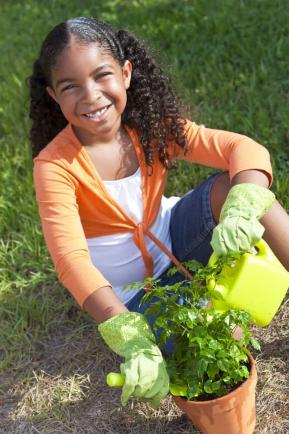
There's a pharmacy in your kitchen and you should get to know it. With the health care crisis, I think it behooves us to get to know natural remedies and preventative medicine. This is not at all to say that herbs and natural remedies should replace traditional medicine. However, there are things that we can incorporate into our diets that can ward off illnesses and even a few that can help with pre-existing conditions.
As a parent, it's important to ensure that your kids understand the importance of good nutrition. Learning about the health benefits of herbs is a good way to teach your children about healthy eating. This helps them adapt to a healthy diet and lifestyle at an early age.
Here's my top 10 list of essential herbs and their applications:
Garlic
Garlic is one of the most amazing plant foods ever. It is actually among the remedies studied in pharmacology classes. Here are some of its benefits: antibacterial, anti-fungal, and anti-viral, antioxidant, immune stimulant, anti-parasitic, anti-vampiric (OK, I just thought that would be funny to throw in), anti-inflammatory and lowers cholesterol. You can take this as a supplement, but I prefer to use things in their natural state because they are just so yummy. My daughter and I eat garlic-gone-wild (pickled garlic cloves) right out of the jar with crackers.
Turmeric
This spice supports healthy joint function, gives you radiant skin, improves digestion, helps maintain healthy bones and joints, maintains healthy cholesterol levels, promotes healthy blood and liver functions and gives immune system support. Turmeric is a component of curry powder, which is another way to work it into your diet. I like drinking an infusion of turmeric when I'm not feeling well. Warms me from the inside out.
Thyme
Thyme is very aromatic and is a great antiseptic. It is also great for respiratory ailments, such as bronchitis. The aroma is reputed to increase memory function as well. Thyme lends itself well to many types of foods: stews, soups, meat dishes and salads.
Lavender
One of my favorite herbs because of its delicious smell. I spray a little lavender water on my pillow at night to sleep better. Lavender is also an antioxidant. This can be used in aromatherapy, an infusion to drink, or throw them in some scones. It also helps prevent bloating.
Basil
This little dynamo can calm your nerves, detox your liver, great source of fiber and if you boil a little and strain, you can spritz on your face to clear up blemishes. I have given this little remedy to people with severe acne and it works great. It's also an anti-inflammatory. Use basil in your spaghetti sauces or drink as an infusion.
Cilantro
Helps purify your body of heavy metals, such as mercury and lead, by drawing them out of your tissues. It's also a great source of fiber and iron. Cilantro lends itself naturally to Indian and Mexican cuisine.
Sage
Has antiseptic and antioxidant, fights fatigue, improves memory, and helps reduce anxiety. A cup of sage tea helps reduce muscle aches and pains that often accompany the flu.
Parsley
Packed with vitamins A, C and K (for healthy blood) and a great breath freshener.
Cinnamon
This reduces blood sugar, so it's great for diabetics. Also anti-viral and anti-microbial benefits. Sprinkle it on your oatmeal (which also lowers cholesterol) in the morning and get a double whammy. Cinnamon helps with menstrual cramps (add some to your warm tea) and can reduce arthritic pain.
Cayenne
As an anti-irritant, cayenne has the ability to ease an upset stomach, ulcer (seems contradictory, but it's true), sore throat, spasmodic and irritating cough, and diarrhea. It is also an anti-cold and flu, anti-fungal, and can prevent migraines. Cayenne is an anti-allergen, anti-inflammatory, a digestive aid (stimulates the digestive tract, increasing flow of enzymes), relieves intestinal gas, detox support, joint pain reliever, antibacterial and mixed with a little unscented lotion, can relieve sore muscles.
Most herbs are confined to a single pot for each plant, so they are a perfect "crop" for your children to grow as they learn about stewardship, germination, propagation, harvesting and dehydration. This is a great way for kids to get their feet wet in the world of kitchen gardening.
There are lots of wonderful books about herbs, many of them geared toward children and some of them free for your e-reader as well.
All of these herbs listed here are safe, but as with introducing anything new to your children, start slowly. There are herbal remedies which have contraindications, such as chamomile, which should not be taken if you are allergic to ragweed or take blood thinners. To get started on learning about herbs and their benefits, Annies Remedy provides some comprehensive information. As a summer educational activity, maybe have each of your children grow an herb and do a report on its various characteristics and qualities. Each year they could grow something new and learn more about natural remedies.

